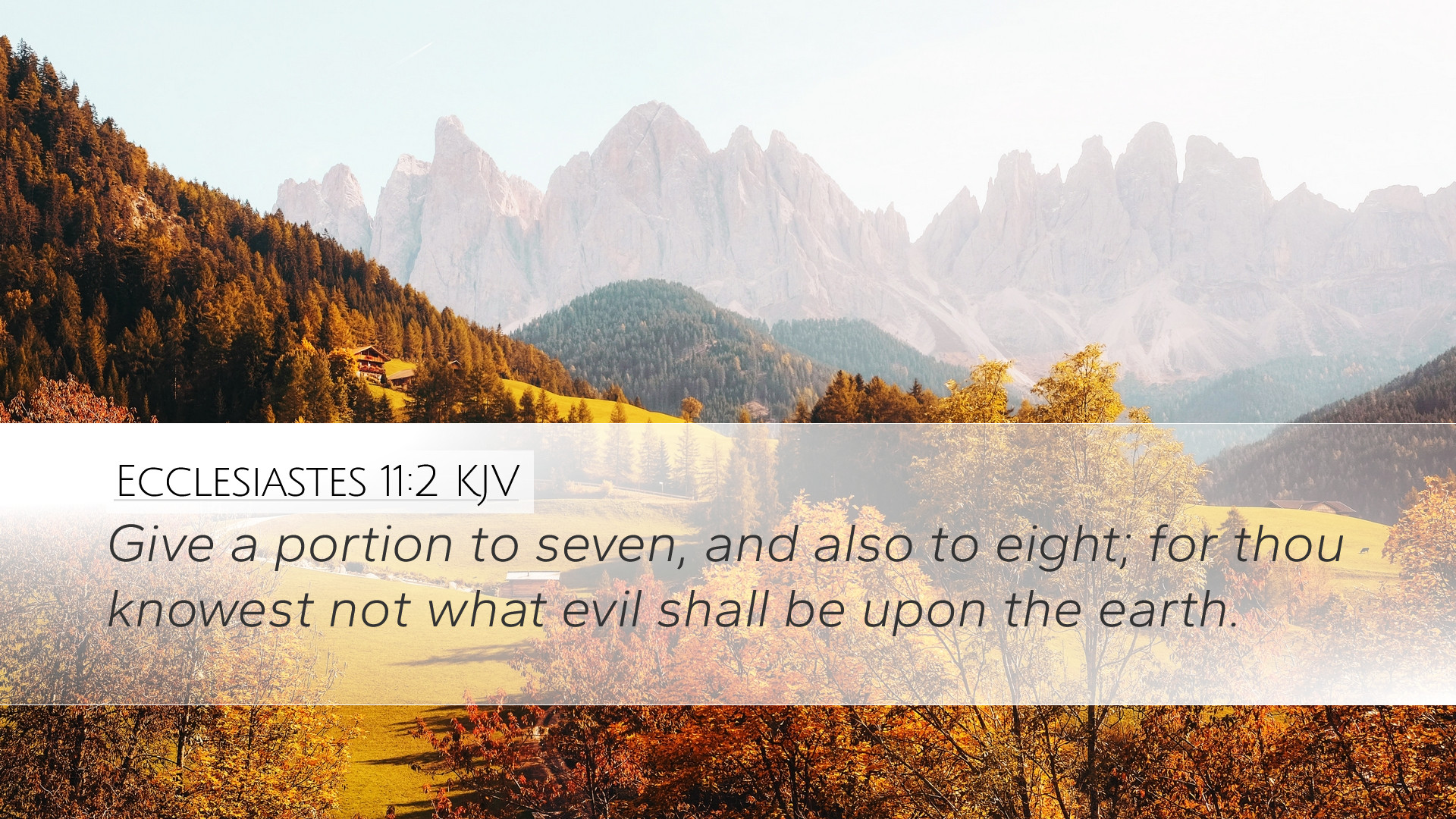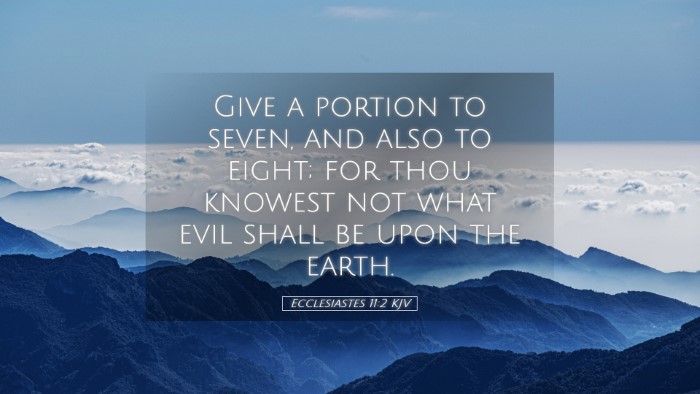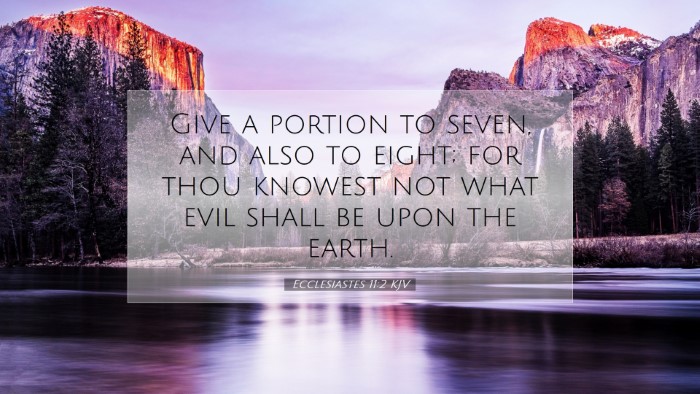Old Testament
Genesis Exodus Leviticus Numbers Deuteronomy Joshua Judges Ruth 1 Samuel 2 Samuel 1 Kings 2 Kings 1 Chronicles 2 Chronicles Ezra Nehemiah Esther Job Psalms Proverbs Ecclesiastes Song of Solomon Isaiah Jeremiah Lamentations Ezekiel Daniel Hosea Joel Amos Obadiah Jonah Micah Nahum Habakkuk Zephaniah Haggai Zechariah MalachiEcclesiastes 11:2
Ecclesiastes 11:2 KJV
Give a portion to seven, and also to eight; for thou knowest not what evil shall be upon the earth.
Ecclesiastes 11:2 Bible Commentary
Ecclesiastes 11:2 - Commentary Overview
Verse: "Give a portion to seven, and also to eight; for thou knowest not what evil shall be upon the earth."
Introduction
The Book of Ecclesiastes, attributed to Solomon, grapples with the meaning of life and the nature of human existence. Ecclesiastes 11:2 speaks to prudent generosity and the unpredictable nature of life's events. In this commentary, we will draw insights from eminent public domain scholars such as Matthew Henry, Albert Barnes, and Adam Clarke to unravel the significance of this verse within its broader context.
Exegesis of the Verse
This verse contains a poignant exhortation to generosity and fiscal prudence. The verse can be viewed as follows:
- Give a portion to seven, and also to eight: This phrase denotes an attitude of abundance and readiness to share resources. The number seven often symbolizes completeness in Scripture; thus, the directive to give to 'eight' implies going beyond mere completeness, suggesting an attitude of overflowing generosity.
- For thou knowest not what evil shall be upon the earth: This cautionary statement addresses the unpredictability of life. The world is fraught with trials and disasters that can unexpectedly invade one’s life.
Commentary Insights
Matthew Henry’s Perspective
Matthew Henry emphasizes the importance of charity and the act of giving. He interprets the exhortation to “give a portion to seven, and also to eight” as a directive for generous stewardship. Henry notes that our lives are uncertain and that we should use our resources not solely for personal gain but for benevolence, extending kindness to others as a safeguard against unforeseen calamities.
Albert Barnes on Distribution
Albert Barnes points out the practical wisdom in the verse, suggesting that diversifying our investments, whether material or spiritual, is essential. He explains that by giving generously and diversely, one mitigates potential risks associated with loss. This notion aligns well with Solomon’s reflections on life’s fleeting nature and the importance of wise living.
Adam Clarke’s Analysis of Uncertainty
Adam Clarke emphasizes the theme of uncertainty in life’s journey. He relates the call to distribute resources with an understanding of societal instability. Clarke asserts that being generous offers not only a means of support to others but also reinforces human relationships and community bonds during turbulent times.
Theological Implications
- Generosity as Virtue: The call to provide for others underscores the Biblical virtue of charity. It reveals that God’s people are to embody His love through selfless acts.
- Preparedness in Uncertainty: Life’s unpredictability necessitates a mindset of readiness for any eventuality. This approach encourages believers to live with an eternal perspective, motivated by God's sovereignty.
- Connection to the Larger Narrative: This verse forms a part of the overarching themes in Ecclesiastes regarding the transience of life and the importance of living wisely. It echoes the sentiments of Proverbs about wisdom and righteousness leading to blessings.
Pastoral Applications
- Encouraging Generous Giving: Pastors can use this verse to teach congregants about the importance of generosity, showing that sharing resources can lead to communal strength and blessings.
- Building Resilience in Communities: In times of crisis, leading by example to distribute aid to those in need can help reinforce faith and trust within the community.
- Promoting Stewardship: Pastoral teaching can focus on the wise management of resources, encouraging believers to invest in both earthly and eternal treasures.
Conclusion
Ecclesiastes 11:2 serves as a reminder of the call for believers to live generously and wisely amidst uncertainty. By drawing together insights from Matthew Henry, Albert Barnes, and Adam Clarke, we find a rich tapestry of meaning that underscores the significance of community, the value of preparedness, and the eternal perspectives we are called to hold. As we reflect on this verse, may we be encouraged to act with generosity and wisdom, trusting in God's unfolding plan amidst life's unpredictabilities.


